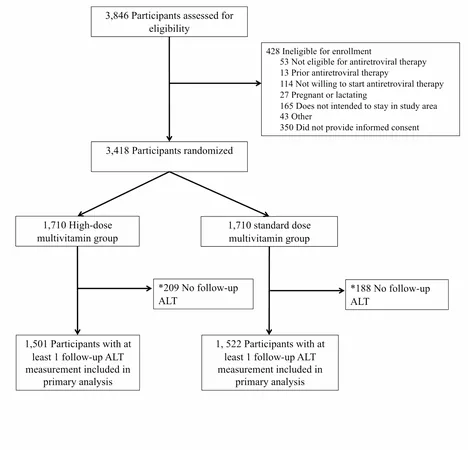
Shocking Discovery: High-Dose Multivitamins May Wreak Havoc on Liver Health of HIV Patients in Tanzania!
2024-09-30
Background
Living with HIV entails a myriad of health challenges, especially concerning nutrient absorption and maintenance. A recent study in Tanzania revealed alarming findings regarding the use of high-dose multivitamin supplements among adults undergoing antiretroviral therapy (ART). Initially part of a randomized clinical trial, this segment of the study had to be halted prematurely due to significant elevations in alanine aminotransferase (ALT), a key indicator of liver health, among those taking high doses of vitamins.
Study Overview
Conducted from 2006 to 2009, this double-blind trial aimed to investigate the differential effects of high-dose multivitamins—packed with B vitamins, vitamin C, and vitamin E—compared to standard-dose multivitamins, which contained single recommended dietary allowances (RDA). Researchers aimed to highlight any links between multivitamin supplementation and the elevation of ALT levels in individuals initiating ART.
In their analysis, scientists utilized Cox proportional hazard models to assess the impact of high-dose multivitamins on ALT elevations, categorizing them into mild/moderate increases, persistent raises, and severe spikes.
Key Findings
The results were startling: high-dose multivitamins were associated with a 41% increase in the risk of any mild/moderate ALT elevation (> 40 IU/L) compared to standard doses. Additionally, there was a 19% increase in the risk of persistent mild/moderate elevations. However, the relationship was less clear for severe ALT elevations, where the risk factor was not statistically significant.
Notably, the study found a significant interaction between multivitamin dosage and CD4 T-cell counts—those with compromised immune systems (CD4 counts ≤ 100 cells/µL) faced a shocking 3.74 times greater risk of severe ALT elevation when administered high-dose multivitamins.
Implications for HIV Treatment
The research sheds light on the complexities involved in treating HIV with cART, emphasizing that the use of high-dose multivitamin supplements might pose significant risks, particularly for immunocompromised individuals. While these vitamins are typically viewed as beneficial, their high doses could lead to acute liver injury, complicating ongoing ART protocols.
Moreover, underlying factors like co-infections—such as hepatitis B or C, common among PLWHA—could exacerbate the effects of these multivitamins, creating a perfect storm for liver health deterioration.
Conclusion
The study showcases the necessity for caution when prescribing high-dose multivitamins for individuals living with HIV. As the dialogue around micronutrient supplementation continues, especially in low- and middle-income countries (LMICs) where nutrient deficiencies are rampant, it becomes ever more critical to tread carefully in understanding the potential long-term impacts on liver health.
As the medical community grapples with these insights, future research is essential to inform the safe integration of multivitamin supplementation into ART regimens while protecting vulnerable populations from adverse drug reactions. In the meantime, clinicians must stay informed and vigilant—because what seems like a simple vitamin could be a ticking time bomb for those most at risk!
Related Concerns:
- The continual rise of adverse drug reactions in PLWHA calls for tailored approaches to treatment regimens. - Current ART regimens may also share responsibility for hepatotoxicity; understanding the interplay between these drugs and micronutrient supplementation is of utmost importance. - Careful monitoring and patient education could play a pivotal role in mitigating these risks.
Stay tuned as we delve deeper into this pressing health issue affecting countless lives!


 Brasil (PT)
Brasil (PT)
 Canada (EN)
Canada (EN)
 Chile (ES)
Chile (ES)
 España (ES)
España (ES)
 France (FR)
France (FR)
 Hong Kong (EN)
Hong Kong (EN)
 Italia (IT)
Italia (IT)
 日本 (JA)
日本 (JA)
 Magyarország (HU)
Magyarország (HU)
 Norge (NO)
Norge (NO)
 Polska (PL)
Polska (PL)
 Schweiz (DE)
Schweiz (DE)
 Singapore (EN)
Singapore (EN)
 Sverige (SV)
Sverige (SV)
 Suomi (FI)
Suomi (FI)
 Türkiye (TR)
Türkiye (TR)